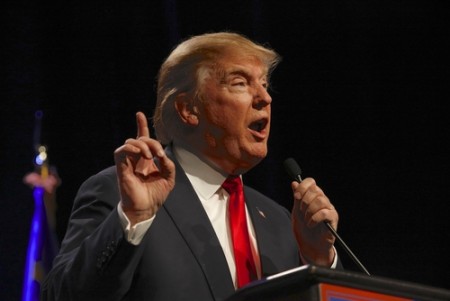Did China speed up trademark approvals for the Trump Organization?

Photo of Donald Trump from Joseph Sohm / Shutterstock.com.
China recently granted approval for 38 trademarks sought by President Donald Trump’s family business for things that include hotels, golf clubs and bodyguard services.
Out of the 38 trademarks, 35 are in the president’s name, the Associated Press reports. Trump’s attorneys applied for the marks in April 2016, as the then-Republican presidential candidate accused China of stealing U.S. jobs and currency manipulation.
Some say the approvals came much more quickly than usual.
“They’re trying to curry favor with the president,” Democratic Sen. Ben Cardin of Maryland told the AP.
Trump has said that he assigned all his business interests to a trust overseen by his son, Donald Trump Jr., and Allen Weisselberg, a Trump Organization executive. The president kept the right to revoke the trust at any time, according to the article. As its only beneficiary, he can benefit financially from the trust.
Alan Garten, the Trump Organization’s chief legal officer, told the AP that the company has been enforcing its intellectual property rights in China for more than a decade, and it has been registering trademarks long before Trump announced plans to run for president.
Dan Plane, a director at the Hong Kong IP consulting group Simone IP Services, told the AP that it’s likely Communist Party officials are monitoring the president’s IP interests.
“This is just way over your average trademark examiner’s pay grade,” Plane said.
A group of prominent law professors in January filed a lawsuit against the president, alleging that payments by foreign powers to his companies violate the Constitution’s emoluments clause.
“A routine trademark, patent or copyright from a foreign government is likely not an unconstitutional emolument, but with so many trademarks being granted over such a short time period, the question arises as to whether there is an accommodation in at least some of them,” Richard Painter, an attorney involved in the lawsuit, told the AP. Now a professor at the University of Minnesota Law School, Painter was the chief ethics lawyer for President George W. Bush.
However, some trademark lawyers didn’t think that the situation was concerning.
“Especially in China, you absolutely need to register defensively, so that people do not exploit your name for commercial gain,” Janet Satterthwaite, a trademark attorney and partner at the Potomac Law Group, told the AP.
Although the process seemed to move more quickly than usual, the Washington, D.C., lawyer said, “it does not look like China did anything extraordinary here.”



